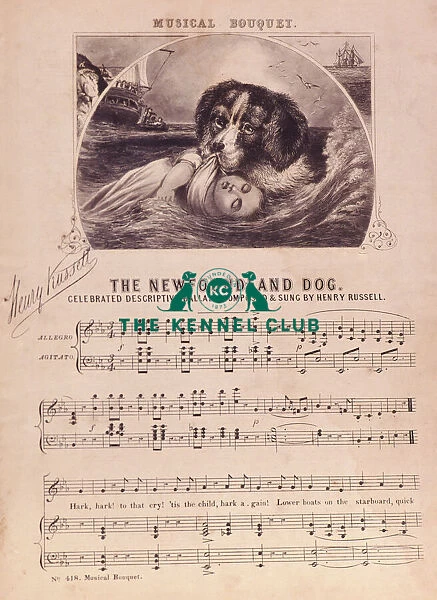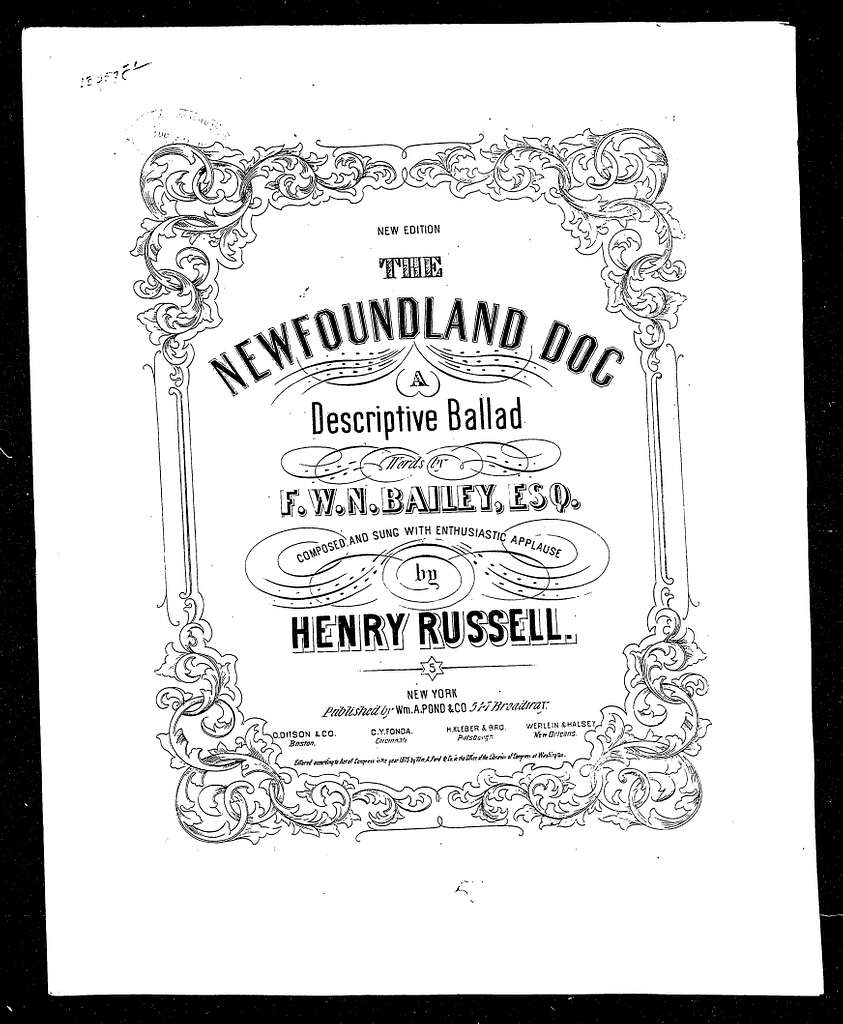
We go down a lot of rabbit holes in the course of ferreting out information about purebred dogs; in the course of verifying whether or not the first dog to win a weight pull competition was a Newfoundland (we also found a source stating that it was an Alaskan Malamute), we came across Henry Russell.
Henry was a popular 19th century British baritone singer, composer, and pianist who’d become dedicated to music at a very young age. As a young adult, Henry spent some time America where he picked up a thing or two, then returned to England and took up an artist residency at the Hanover Square Rooms in London. There, his musical career really took off, in large part because he had brought back to England music influenced by the parlor songs so popular in nineteenth century America. This type of music was simply piano accompaniment with a narrow range of vocals, but the topics of his songs dealt with weighty issues such as abolition, temperance, and mental health.
The press had dubbed Henry the “singer for the million” during the peak of England’s reform movement, but his career was not without hiccups.In 1837, Henry was accused by the National Gazette of plagiarizing French composer, Jean-Joseph Rodolphe’s music and passing them off in his own. To add to Henry’s troubles, Musical World, a preeminent British music journal of the day, declared Henry to be a fraud, and accused him of scamming Americans out of their money. Surprisingly, the accusations seemed to have had little to no effect on his career, and anyone interested in learning more might want to read this account.
We pivot to Henry Russell’s most famous song, “A Life on the Ocean Wave,” based on a poem by Epes Sargent. In the poem, Sargent described what it was like to walk on the Battery in New York City and watch ships enter the harbor. Henry set the poem to music, and in 1843, the song that became popular on both sides of the ocean became the Regimental March of His Majesty’s Royal Marines. This nautical theme showed up in another of Henry’s most popular works that would be published a few years later.

“The Newfoundland Dog,” a descriptive ballad, was Henry’s tribute to the Newfoundland, a celebration of the heroic breed’s characteristics and abilities, particularly at water rescue. Was the song, set in E-flat major and published in 1843, inspired by a Emily Dickinson’s Newf, Carlo? We don’t know, but a “Carlo” is mentioned in the lyrics written by F.W.N. Bailey Esqr.
Life saver! Wave stemmer!
Deep diver! away!
Night’s shadows are closing
The portals of day;
One the breast of the billow
We hear his low wail,
We have put up the rudder,
And furl’d up the sail.
No signal from Heav’n
Will show where he be;
And where’er he be driven
We men cannot see.
Ho! Carlo! Newfoundland!
Go follow his cry,
As it gaspingly answers
The sea moaners sigh;
The boat shall be lower’d,
The men shall belay,
Life saver! Wave Stemmer!
Deep diver away!
Away fetch him out! fetch him up! seize him! ho!
Mount the wave dog! mount the wave dog! ha! down, down below!
hark! watch! bear a hand bring a light not a sound bring a light
Hark! there’s a moan
Yes the waves moaning over the drown’d
God’s spirit preserve him,
Amen and amen.
Hist! a flash and a motion
Ha! Carlo Ha! Carlo again
Good dog then good dog then
Bear a hand then pull tight
A boat hook a boat hook
He’s in and all’s right;
Come Carlo quick follow,
Fine fellow hard strife,
Wave stemmer! Deep diver!
We owe you a life.
